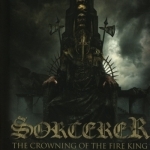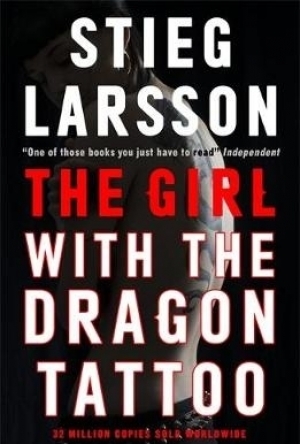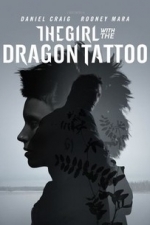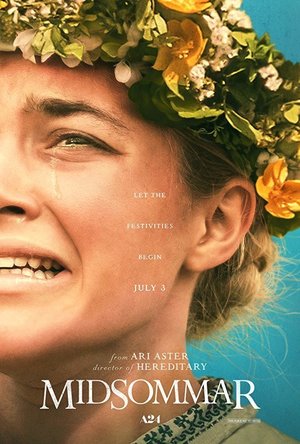
Seapilot for iPad
Navigation and Utilities
App
Professional marine navigation used to require an expensive GPS plotter. Now, same technology used...
Acanthea Grimscythe (300 KP) rated The Girl with the Dragon Tattoo in Books
May 16, 2018
The Girl with the Dragon Tattoo is an utterly enthralling crime thriller, centered around Mikael Blomkvist, a journalist convicted of libel, Lisbeth Salander, a ward of the government with a penchant for hacking, and the age-old mystery of what happened to Harriet Vanger: a daughter of the prominent Vanger family that went missing in 1966 and is presumed to have been murdered. Filled to the brim with corporate corruption, misogynistic views, and sharp twists that could not be done justice by the films, Larsson has undoubtedly woven a masterpiece - one that I was unable to put down until the last page was read. I mean that quite literally, as I didn't go to bed until after five this morning.
It's not very often that a book snares me so strongly that I cannot stop myself from turning its pages, and the way in which this one sunk its claws into me has not happened in a very, very long time. The plot is complicated and filled with dead ends, but every single bit of information is also vital to the progression of the story. At first read, that might sound a bit contradictory, and in a way it truly is. When Blomkvist is hired by the aging Henrik Vanger to look into Harriet's disappearance, he is given a cold case with no open leads. Each and every time he finds something promising, it fails to work out. In many cases, this is not an easy style to pull off. Other books that have created this sense of hopelessness have largely succeeded in boring me half to death, and in some cases I've dropped them.
When it comes to the characters in a book, the way in which they are written can easily make or break the story. Extreme distaste, in some cases, can lead to difficulty in finishing a book for some readers, while others loath the so-called "Mary Sue" character. In The Girl with the Dragon Tattoo, Larsson's characters are part of relationships that are largely unconventional, especially to the mind of a girl raised in the conservative Southern United States and. The interaction that results from these relationships help to drive the story forward by not only introducing the reader to a wide range of characters, but by also providing those characters, some of which are deeply flawed, with an impressive amount of depth.
While some of the content is, without a doubt, sensitive material for some readers, Larsson also uses The Girl with the Dragon Tattoo as an opportunity to highlight statistics on sexual assault in Sweden, and for that I must give him props. Even in America, there is a lack of seriousness when it comes to allegations of rape and, more recently, things tend to get brushed under the rug, for lack of a better term, if the perpetrator of the crime has any reputation that could be deemed worthwhile. It is a disgusting, dehumanizing way of treating a very real issue, and Larsson hones in on this while simultaneously creating a very strong, independent heroine that readers like myself can relate to, sometimes unfortunately so.
The next book is definitely on my to-read list, but I don't know when I'll get around to it. Hopefully, I'll be fortunate enough to cross it on one of my thrift-shopping trips. It was most definitely worth my sleepless night.

Embark: User friendly personalised nautical charts
Navigation and Travel
App
Embark gives you FREE and updated charts, crafted on data from the Hydrographic Offices. A smooth...

POOW The Food Hero
Health & Fitness and Medical
App
POOW The Food Hero is a tool for parents / healthcare to help and use to support and motivate...

The Crowning of the Fire King by Sorcerer
Album Watch
Sorcerer was formed in Stockholm, Sweden in 1988 by Johnny Hagel (Tiamat, Sundown, Lithium), Tommy...
metal
Gareth von Kallenbach (980 KP) rated The Girl with the Dragon Tattoo (2011) in Movies
Aug 7, 2019
Daniel Craig stars as Mikael Blomkvist, who at the opening of the film has recently lost a court case for which he was being sued for libel by a prominent business figure. His career is in ruins and virtually all of his savings gone as a result of the trial and punitive damages. So when he is contacted by an attorney representing the wealthy and powerful Vanger family, he agrees to meet. Although highly reluctant to take a meeting, Mikael takes the four hour train ride north of Stockholm to a cold and remote island to meet with Henrik Vanger (Christopher Plummer). Henrik wishes Mikael to investigate the disappearance of his niece some 40 years earlier, a niece vanished under the families’ very noses and not a trace of her has been discovered since. Henrik is convinced that she has met with foul play, yet every year on his birthday, he continues to receive a gift of ornate pressed flowers in an anonymous package.
Henrik believes that the killer is haunting him by sending the gifts and that a member of his family may be to blame. Although skeptical of being able to find anything 40 years later, Mikael accepts the case and soon sets up residence in a small cabin on the island and begins his investigation by combing through police reports, conducting interviews, and examining photographs and newspaper clippings. Mikael had been warned that the other members of the Vanger family may not be too thrilled with his presence as not only is the family fractured, they all have their share of secrets.
At the same time, a very Goth punk girl named Lisabeth (Rooney Mara), is fighting her own demons. Lisabeth is an extremely gifted computer and surveillance expert who specializes in gathering background information on individuals. As such, her skills have made her in high demand with her employer. Unfortunately, Lisabeth is also a deeply antisocial person who is prone to lash out violently if provoked. Much of this stems from an extremely traumatic childhood spent in institutions which resulted in Lisabeth being placed as a ward of the state, not deemed competent to care for herself. This arrangement requires her to check in on a regular basis with a representative who, unfortunately for her, has recently suffered a stroke and places her in the care of the new guardian.
The new guardian subjects Lisabeth to horrific demands just so Lisabeth can access her money. The traumatized Lisabeth does not play victim long and in a twist of fate, is assigned by Henrik’s attorney to assist Mikael since she did the background check on him prior to Mikael being approached by Henrik for the investigation. The unlikely duo combined to form a highly efficient pair as they start to piece together the clues which indicate a brutal string of murders leading back for decades. As they work together, the relationship deepens and the reserved Lisabeth starts to come out of her shell. Tension mounts as danger surrounds them in an epic race against time to solve the case that certain members of the family do not want solved.
The film runs approximately 2 hours and 45 min and does take a little while to get started as the landscape and back story of the characters is established. The film has some very dark and brutal moments, which are hard to watch, yet were not as graphic as those in the Swedish language version. Craig and Mara work very well with one another and props to Craig for being willing to put on weight and occasionally looked disheveled to enhance his character.
Mara gives a masterful performance as the complicated Lisabeth, the anti-damsel-in-distress heroine, who subtly shows the many complicated sides to the character. Noomi Rapace first portrayed the character and has gone on to prominent success in Hollywood with a slew of upcoming high profile films. I would expect nothing less for Mara with two other sequels in this series to film. I am sure this breakout performance will not go unnoticed as it is an extremely difficult and daring role that few in Hollywood would want to tackle, much less be able to pull off as convincingly as she did.
I was extremely happy to see that the character names, settings, and situations were not changed in the new version, and it was refreshing to see the film set in Sweden and not relocated to London or New York. The biggest issue I had with the film was with the ending, which deviated from the previous versions. I will not provide spoilers, suffice it to say the resolution was a bit too tidy of a Hollywood ending and in my opinion greatly undermined one of the central characters of the film. That being said the film is a bold and dynamic vision from Fincher and is a deeply dark and disturbing story that is difficult to forget.
Kirk Bage (1775 KP) rated Midsommar (2019) in Movies
Jan 22, 2021
So, when I saw the trailer for Midsommar in 2019 and realised it was the same director, it went straight to the top of my must see list. Add to the appeal the significant lure of the lead actress and main character, the extremely promising Florence Pugh, who blew me away for her raw ability in Lady Macbeth, and beguiled me even more in every minute of Chan-Wook Park’s superlative espionage mini-series The Little Drummer Girl, and I knew this was something I didn’t want to miss. Sometimes it only takes two projects on a CV to elevate a future star from obscurity to A-list potential. In Pugh I had already seen enough range, charisma and depth to suspect she was one of those special few. By the end of Midsommar I was convinced of it!
Plot wise, all you need to know going in cold is that Dani (Pugh) racked with grief following early scenes is dragged to Sweden to participate in the Midsommar celebrations of a small isolated community, as her relationship with boyfriend Christian is very much on the rocks and she is in need of some catharsis and release. At first the Idyllic setting, bathed in sunlight you can almost feel, seems refreshing and clean. The whites, yellows and blues of the images are so crisp you can imagine every smell and texture, and you find yourself smiling, despite the fact a creeping unease and sinister secret is already infiltrating the calm in wonderfully subtle ways.
Needless to say it goes to some very dark and strange places. So much so I gasped out loud twice and stood up from my seat involuntarily on one particularly disturbing moment. To try and explain how that unfolds and comes to be is both impossible and would need some big time spoilers, so I won’t do that. It’s enough to say that where you are emotionally at the end of this filmic experience is very, very far from where you started. Much in the same way as Hereditary, you feel you have been dragged by the hair on a very uncomfortable journey that is both strangely unsatisfying, confusing and upsetting; you can’t say you “liked” either film as much as admitting you can’t stop thinking about them and need to see them again to absorb the detail, if indeed you can bear that.
As of writing this I haven’t gone back and watched this again – I’m genuinely wary of putting myself through it a second time! But, I have gone back to Hereditary and appreciated it much more knowing the ending already, and seeing the detail that is there from the beginning, that makes it all make sense in a way it doesn’t first time around. Midsommar, I sense, is the same, in that there has been so much attention to the build up and background that you will see and hear relevant clues to the mystery much more the more times you watch it. What they are wearing, images on walls and seemingly insignificant things the camera picks up on create a tapestry of loose threads that can be woven together into deeper meaning if that is what you want to do.
Without doing that it may seem like a bewildering entity, deliberately odd for the sake of it, and as such it could put anyone off. At 2 hours and 28 minutes it is a bit of a stretch, and the last half hour, once it descends into the complete madness suggested earlier, perhaps doesn’t live up to the promises it makes. Also, despite Pugh being a mesmeric presence from start to finish, the supporting cast can’t quite go with her on the same level. Even the talented Will Poulter seems burdened by a less than three dimensional character, underwritten as are many in a script that focuses so much on Dani that everything else suffers.
My overall impression of it as a film is that it falls short of greatness by a narrow margin, but comes very close at times to genuine genius. It is the promise of Aster as a filmmaker that excites me most, even if this is not the film it could have been with a little more experience, maturity and, perhaps, budget. It is his Bottle Rocket, or Hard Eight, when you suspect he will have a Grand Budapest Hotel, or a There Will Be Blood in him at some point down the line.
In conclusion, I can’t emphasise enough how much I was drawn to every moment of what Florence Pugh was doing. Be wary of the film if a casual viewing experience is what you want, because it may infuriate you, and compel you even to switch it off, if you are not totally ready to meet it where it wants to take you. But, watch it for Pugh and see what a rare talent she is bringing to cinema into the 2020s. A very exciting prospect indeed.
Chris Sawin (602 KP) rated Midsommar (2019) in Movies
Jun 26, 2019 (Updated Jul 4, 2019)
Dani’s (Florence Pugh) life is turned inside out once a devastating tragedy leaves her dumbstruck. She leans on her boyfriend of four years, Christian (Jack Reynor), for support, but their relationship is obviously strained. Along with their friends Josh (William Jackson Harper) and Mark (Will Poulter), Dani and Christian end up going on vacation to rural Sweden. They travel to a small village where their friend Pelle (Vilhelm Blomgren) grew up and now serves as their host. A rare nine-day festival that only occurs once every 90 years is being celebrated. Josh is utilizing the trip as a means to bulk up his folklore thesis for college while Mark is more interested in partaking in the Swedish women. Christian is attempting to figure out what his thesis will be while Dani searches for some sort of guidance after such a tragic occurrence. Their trip becomes increasingly more peculiar the longer they stay as they’re forced to witness violent rituals and are encouraged to embrace the ways of a Pagan cult.
The intricate illustrations throughout the film like in the opening shot, the elongated love potion cloth, or the walls of the barn-like structure Dani and her friends sleep in, give Midsommar this dark fairy tale aspect to it that a film like Pan’s Labyrinth would be proud of. The Pagan roots of Pelle’s village and the film’s metaphorical feet being so firmly planted in such rich folklore give Midsommar this cautiously fanciful aesthetic. The film capitalizes on the nostalgic sensation of when fairy tales and children’s books were read to you as a child. There are consistent signs that things aren’t right, paranoia lurks around every corner, and the locals set off every ominous alarm in your body, but there’s that naïve part of us buried deep down that wishes for and hopes for a happy ending because cosmetically we believe that is what resides at the end of every fairy tale not written by Jakob and Wilhelm Grimm (The Brothers Grimm).
It’s also interesting observing the main and supporting characters of the film or basically all of the “outsider” guests of the festival. Pelle acts as a conduit/guide between his village and the outside world, Josh is a historian/researcher, Mark is a mocker/fool, Dani and Christian are a strained couple, and Connie (Ellora Torchia) and Simon (Archie Madekwe) are a flourishing one. According to Wikipedia, Ari Aster based Dani and Christian’s relationship on a bad breakup. Midsommar is also way funnier than it has any right to be; something Hereditary completely distanced itself from. Midsommar goes out of its way to boast about who Dani’s real family is in the film. The unified chanting, outrageous theatrics, and harmonized moaning may seem like mockery or complete insanity to some. While it is humorous at times, it seems like this is the way the locals can experience everything everyone else does as a cohesive unit. This seems relevant to emotions, hallucinogens, and even sustenance; this cult does everything together.
Midsommar isn’t going to sit right with a lot of people, especially since Ari Aster desired to be confusing when it came to making the film. With all of the drug-taking in the film being so common, Midsommar may leave you feeling as groggy and disoriented as the characters on screen. However, in between the sacrifices, the brutality, the graphic nature of the film, inbred oracles, and plethora of naked mature women moaning in unison there’s something unique and brilliant about Midsommar you can’t find elsewhere. It may draw parallels to films like Robin Hardy’s The Wicker Man and may feel like a bleaker version of The Wizard of Oz on a bad acid trip, but Midsommar is unlike any other film you’ll see this year. In a way, Dani and her friends all get exactly what they came for but the end outcome is that the majority of them bit off more than they could chew. Truth be told, you’ll never look at a bear in a film the same way again even if it does remind you of the Tanooki suit Mario wore in Super Mario Bros 3. This is the type of film where you could literally tell someone everything that happens and it wouldn’t really spoil the film for them. The context of these events is important to witness in succession and in their entirety since what each individual takes away from the film will likely differ person to person.
There’s a deliberate pacing of the film many will find too slow and uneventful as the film’s two and a half hour runtime will already feel daunting. Aster has teased that the original cut of the film was three hours and 45 minutes and he has a version of the film that is 25 minutes longer that was difficult to cut down to the theatrical cut currently in theaters. An extended cut of the film or a large amount of deleted scenes on the Blu-ray (how about that levitation sequence from the trailer?) would certainly be intriguing.
If you enjoy ambiguous filmmaking where everything isn’t explained and the film’s imagery can mean more than one specific thing, then Midsommar may be worth checking out. It is an outlandish experiment by Ari Aster that a large quantity will likely deem a failure. Personally speaking though, Midsommar is such an unconventionally different ceremonial fever dream loaded with preposterousness, beautiful cinematography, hilarity, and anxiety-fueled-dread that it’s not only memorable and bold but also the type of one-of-a-kind film experience I crave whenever the lights dim and the quiet hum of a projector accelerates into a dull yet soothing roar.


